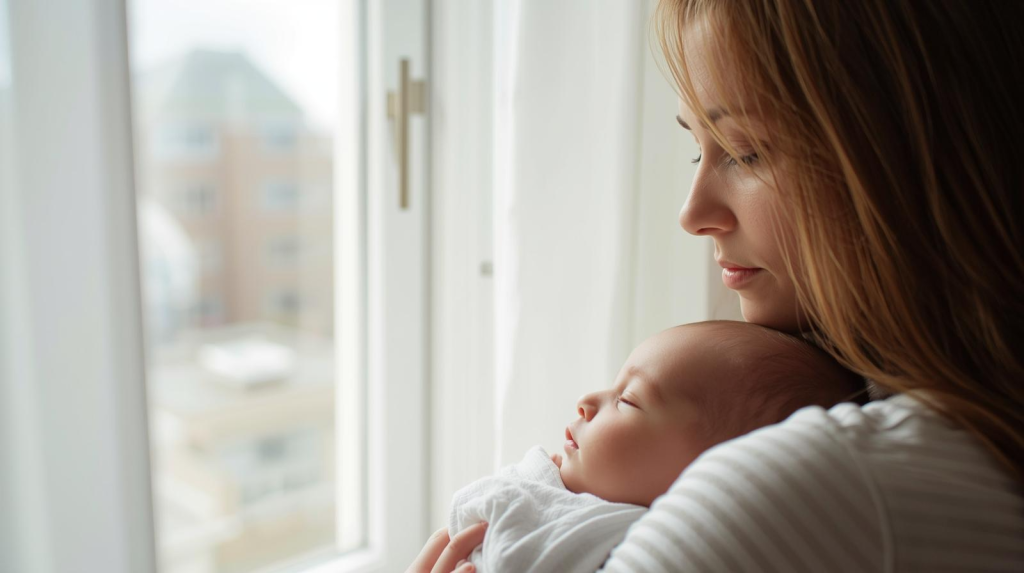A month of parenting reveals profound changes, insights, and growth. This reflection offers valuable lessons for every parent.

Parenting is a journey that transforms not just the child but also the parent. After thirty days of navigating sleepless nights and joyful milestones, one can’t help but notice the shifts in perspective and approach. From the initial chaos of diaper changes to the tender moments of bonding, every day brings new lessons. It’s a whirlwind of emotions, challenges, and unexpected joys that shape not only the child but the parent as well.
Key Takeaways
- Reflective practices enhance self-awareness and emotional growth.
- Adapting strategies based on daily experiences strengthens the parent-child bond.
- Each day offers insights that contribute to personal growth and parenting evolution.
The Early Days: Chaos and Learning

The first few days of parenting can feel like a blur. There’s a constant cycle of feeding, changing, and soothing. It’s overwhelming, and many new parents might find themselves questioning their abilities. It’s in these chaotic moments that the seeds of reflection begin to sprout.
For instance, one might realize that the frantic pace of life doesn’t allow for much time to think. Yet, when the baby finally sleeps, there’s a quiet moment to ponder. This is where reflective parenting practices come into play. Taking a moment to breathe and assess the situation can lead to significant insights.
In these early days, parents often learn the importance of flexibility. Plans can change in an instant, and the ability to adapt becomes crucial. This adaptability is a skill that not only benefits the child but also fosters personal growth.
Daily Reflections: Insights and Adjustments
As the days progress, the chaos begins to settle into a routine. Each day presents opportunities for reflection. What worked yesterday might not work today. This realization can be humbling but also empowering.
Daily reflections allow parents to track their progress. They might notice that certain strategies lead to calmer evenings or happier mornings. For example, one parent might find that introducing a bedtime routine helps their child sleep better. This insight doesn’t just improve the child’s sleep; it also enhances the parent’s well-being.
Moreover, these reflections can highlight emotional growth. Parents often find themselves more in tune with their feelings and those of their child. This emotional awareness fosters a deeper connection. When a parent recognizes their child’s cues, it strengthens the bond and builds trust.
Challenges and Wins: The Rollercoaster of Parenthood
Parenting isn’t just about the highs; it’s also about navigating the lows. There are days filled with frustration and exhaustion. A crying baby can feel like an insurmountable challenge. Yet, it’s in these moments that the true essence of parenting is revealed.
Reflective thinking allows parents to process these challenges. Instead of feeling defeated, they can analyze what went wrong and how to adjust. Perhaps it’s a matter of changing feeding times or recognizing the need for more cuddles. Each setback becomes a lesson, and each lesson contributes to personal development.
Celebrating small wins is equally important. Whether it’s a successful nap or a moment of laughter, these victories remind parents of the joys of the journey. Keeping a journal of these moments can be a powerful tool for reflection. It serves as a reminder of progress and growth, both for the parent and the child.
Mindful Parenting: Shifts in Perspective
As the month unfolds, many parents begin to embrace mindful parenting practices. This approach encourages being present in the moment, fully engaging with the child. It’s about putting down the phone, turning off the distractions, and focusing on the here and now.
Mindfulness can lead to significant shifts in perspective. Parents may find themselves appreciating the little things—like the way their baby smiles or the sound of their laughter. This appreciation fosters a deeper connection and enhances the parent-child relationship.
Moreover, mindful parenting encourages self-awareness. Parents start to notice their reactions and emotions in various situations. This awareness allows for more thoughtful responses rather than knee-jerk reactions. For example, instead of getting frustrated when the baby cries, a mindful parent might take a moment to breathe and assess the situation calmly.
The Evolution of the Parent-Child Relationship

As the month draws to a close, the evolution of the parent-child relationship becomes evident. The bond deepens, and the dynamics shift. Parents often find themselves learning from their children just as much as they are teaching.
This reciprocal relationship highlights the importance of reflective parenting. It’s not just about guiding the child; it’s about growing alongside them. Parents might notice that their child’s personality is emerging, and they begin to adapt their strategies accordingly.
For instance, a parent may realize that their child responds better to gentle encouragement rather than strict discipline. This insight can lead to a more harmonious household and a stronger bond. The parent learns to appreciate the child’s individuality and adjust their approach to nurture it.
Personal Growth: A Journey of Transformation
Reflecting on thirty days of parenting reveals not just changes in the child but profound transformations within the parent. The journey is filled with ups and downs, but each experience contributes to personal growth.
Parents often find themselves more resilient and adaptable. They learn to embrace uncertainty and find joy in the unexpected. This growth isn’t just about becoming a better parent; it’s about becoming a better person.
Moreover, the challenges faced during this month can lead to a greater sense of empathy. Parents may find themselves more understanding of others’ struggles, recognizing that everyone is on their own journey. This empathy can strengthen relationships outside the family unit, fostering deeper connections with friends and community.
Practical Advice for Reflective Parenting
As this month of reflection comes to an end, it’s essential to carry these insights forward. Here are some practical tips for parents looking to continue their journey of growth:
- Keep a Journal: Document daily reflections, insights, and challenges. This practice helps track progress and reinforces learning.
- Practice Mindfulness: Set aside time each day to be present with your child. Engage fully in activities, whether it’s playtime or feeding.
- Embrace Flexibility: Understand that parenting strategies may need to change as your child grows. Be open to adapting your approach.
- Celebrate Wins: Acknowledge small victories, whether it’s a peaceful nap or a joyful moment. These celebrations can boost morale and strengthen the bond.
- Seek Support: Don’t hesitate to reach out to other parents or communities. Sharing experiences can provide valuable insights and encouragement.
Conclusion
Reflecting on thirty days of parenting reveals a journey filled with growth, challenges, and profound changes. It’s a time of transformation that shapes not only the child but the parent as well. Each day offers lessons that contribute to personal development and strengthen the parent-child bond.
As parents continue on this journey, embracing reflection and mindfulness can lead to deeper connections and a more fulfilling experience. It’s not just about raising a child; it’s about growing together, learning from each other, and navigating the beautiful chaos of parenthood.
So, as you move forward, take a moment to reflect on your own parenting journey. What changes have you noticed? How have you grown? The answers might surprise you and lead to even more profound insights.
FAQ
Is it normal to feel like I’m barely surviving rather than noticing any growth or insights?
Absolutely. The early days of parenting, especially, are often about pure survival mode. You’re exhausted, overwhelmed, and just trying to get through each day. Growth and insight don’t always feel profound in the moment—they’re often only visible when you look back. If you’re in the thick of it and can’t see any changes yet, that’s completely normal. The fact that you’re still showing up and caring for your child is growth itself, even if it doesn’t feel transformative. Give yourself permission to just survive when that’s all you can manage.
How am I supposed to reflect on my parenting when I barely have time to shower?
Reflection doesn’t have to mean sitting down with a journal for an hour. It can be as simple as a two-minute mental check-in during a quiet moment—maybe while feeding your baby or waiting for them to fall asleep. Ask yourself one question: “What went well today?” or “What was hard, and why?” Even these brief moments count. If formal reflection feels impossible right now, that’s okay. You can always come back to it when life settles a bit. The goal isn’t adding another task to your overwhelming list.
I keep making the same mistakes over and over. Am I actually learning anything?
Repeated mistakes don’t mean you’re not learning—they mean you’re human and parenting is hard. Change takes time, and patterns don’t break overnight. The fact that you’re aware you’re making mistakes shows you are reflecting and learning, even if behavior change lags behind awareness. Keep noticing the patterns, be patient with yourself, and focus on small improvements rather than expecting perfection. Each time you catch yourself in the moment or recover more quickly, that’s progress.
What if my reflections just make me feel worse about my parenting?
If reflection is primarily generating shame or self-criticism rather than insight, you might need to adjust your approach. Reflective parenting should help you learn and grow, not tear yourself down. Try shifting from “What did I do wrong?” to “What can I learn from this?” or “What would I do differently next time?” If you find yourself spiraling into negative self-talk during reflection, it might help to talk with a supportive friend, partner, or therapist who can offer perspective. Reflection should be constructive, not destructive.
I don’t notice any profound changes or insights like the article describes. Does that mean I’m doing something wrong?
Not everyone experiences dramatic revelations or transformative moments, and that’s perfectly fine. Parenting growth is often subtle and incremental rather than sudden and obvious. Your experience is valid even if it doesn’t match someone else’s narrative. Some parents are naturally more introspective while others learn differently. Don’t force yourself to have insights you’re not genuinely having—just focus on being present with your child and responding to what actually comes up in your daily life.
How do I know if I’m being too hard on myself or if I genuinely need to change something?
Ask yourself: “Is this thought helping me improve, or is it just making me feel terrible?” Constructive reflection identifies specific behaviors you can adjust: “I noticed I get impatient during bedtime—maybe I need to start the routine earlier when I’m less tired.” Destructive criticism is vague and absolute: “I’m a terrible parent and always mess everything up.” If your reflections lead to actionable changes, they’re useful. If they just lead to shame without direction, you’re probably being too hard on yourself.
My partner and I are noticing completely different things about our parenting. Is that a problem?
Different perspectives can actually be valuable. You’re both seeing the situation through your own lens, and comparing notes can give you a more complete picture. What one person notices as a challenge, the other might see as progress. Share your reflections with each other and look for patterns or insights that emerge from combining your observations. This can strengthen your co-parenting partnership. It’s only a problem if your different perspectives lead to conflict rather than collaboration.
I feel like I’m changing so much as a person that I barely recognize myself. Is this normal?
Yes, this is one of the most profound aspects of becoming a parent. The person you were before having children doesn’t disappear, but parenthood fundamentally reshapes your priorities, identity, and daily life. Some people find this transformation empowering; others find it disorienting or even distressing. Both reactions are valid. It’s okay to grieve aspects of your pre-parent self while also embracing who you’re becoming. If the changes feel overwhelming or you’re losing touch with your core identity, talking with other parents or a therapist can help you process this transition.
Should I be journaling every day to track my parenting journey?
Only if it genuinely helps you and doesn’t become another source of pressure. Journaling can be a powerful reflective tool for some people, while others find it tedious or anxiety-inducing. If you enjoy it and it provides insights, great. If it feels like homework you’re failing at, skip it. You can reflect through conversations with your partner or friends, voice memos, photos with brief captions, or just quiet mental check-ins. Find what actually works for your personality and schedule, not what you think you should be doing.
What if I realize through reflection that I’ve been approaching something completely wrong?
This realization, while uncomfortable, is actually valuable. Recognizing something isn’t working is the first step toward changing it. Don’t dwell on time you think you’ve “wasted” or mistakes you’ve made—children are resilient, and it’s never too late to adjust your approach. Simply make the change moving forward. You might even share age-appropriately with your child: “I’ve realized bedtime was feeling really stressful, so we’re going to try something different.” This models growth mindset and shows that everyone can learn and improve.
How do I balance being reflective with just trusting my instincts?
Reflection and instinct aren’t opposites—they work together. Your instincts are immediate responses, while reflection helps you understand those instincts and refine them over time. If your gut tells you something isn’t working, reflection can help you understand why and what to do differently. If reflection is making you second-guess yourself constantly, you might be overthinking and need to trust your instincts more. The goal is finding a rhythm where you’re thoughtful but not paralyzed, responsive but not reactive.
References
- https://www.jaiinstituteforparenting.com/the-four-stages-of-parenting-a-journey-of-growth
- https://www.calm.com/blog/survival-mode
Related Articles
- https://betweenusparents.com/how-to-keep-your-teen-talking-building-trust-and-open-dialogue/
- https://betweenusparents.com/that-one-talk-that-changed-everything-how-quality-parenting-communication-transforms-relationships/
- https://betweenusparents.com/what-happens-when-teens-feel-heard-building-trust-and-confidence/







